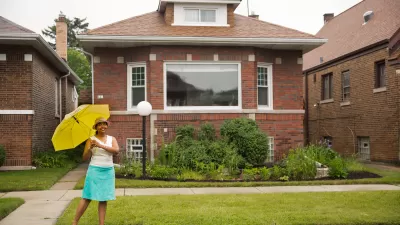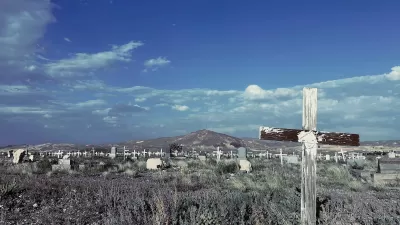Homeownership is often promoted as a way for low-income and minority families to build wealth. But it is those very families who assume the most risk in buying a house.

Joe Cortright employs data from the aftermath of the housing bubble to demonstrate how, for low-income and non-white households, "home ownership could turn out to be a wealth-destroying, not a wealth-building, proposition."
He writes in City Observatory:
"Housing can be a good investment if you buy at the right time, buy in the right place, get a fair deal on financing, and aren’t excessively vulnerable to market swings. Unfortunately, the market for home-ownership is structured in such a way as to assure that low-income and minority buyers meet none of these conditions."
In a national housing market still informed by its history of racism, here's how each of those variables works against non-white and low-income households:
1. Timing.
"The best time to buy, from a wealth-building perspective, is when housing prices are low and growing sluggishly. But generally, such times coincide with limited credit availability … Only the 'best' borrowers have access to home loans when prices are low."
2. Location, location, location.
"In segregated housing markets, the behavior of whites to avoid Black and Hispanic neighborhoods means that it's much more difficult for those communities to see consistently rising home values." As a result, "ethnic minorities tend to buy in neighborhoods that have lower rates of home price appreciation."
3. Access to credit.
"The evidence is that low-income borrowers and ethnic minorities pay, on average, higher interest rates." And of course, "if you pay more for your mortgage, that raises the cost and lowers the returns to homeownership."
4. Economic resilience.
"Low income and minority families often have limited financial resources beyond the equity in their homes and therefore are poorly positioned to cope with financial setbacks—loss of a job, a major medical expense or home repair—and missing mortgage payments can quickly push them into default."
City Observatory follows this analysis with more on how an anti-poverty strategy built on promoting homeownership can actually worsen inequality, and its implications for affordable housing.
FULL STORY: Homeownership: A failed wealth-creation strategy

Alabama: Trump Terminates Settlements for Black Communities Harmed By Raw Sewage
Trump deemed the landmark civil rights agreement “illegal DEI and environmental justice policy.”

Study: Maui’s Plan to Convert Vacation Rentals to Long-Term Housing Could Cause Nearly $1 Billion Economic Loss
The plan would reduce visitor accommodation by 25% resulting in 1,900 jobs lost.

Planetizen Federal Action Tracker
A weekly monitor of how Trump’s orders and actions are impacting planners and planning in America.

Waymo Gets Permission to Map SF’s Market Street
If allowed to operate on the traffic-restricted street, Waymo’s autonomous taxis would have a leg up over ride-hailing competitors — and counter the city’s efforts to grow bike and pedestrian on the thoroughfare.

Parklet Symposium Highlights the Success of Shared Spaces
Parklets got a boost during the Covid-19 pandemic, when the concept was translated to outdoor dining programs that offered restaurants a lifeline during the shutdown.

Federal Homelessness Agency Places Entire Staff on Leave
The U.S. Interagency Council on Homelessness is the only federal agency dedicated to preventing and ending homelessness.
Urban Design for Planners 1: Software Tools
This six-course series explores essential urban design concepts using open source software and equips planners with the tools they need to participate fully in the urban design process.
Planning for Universal Design
Learn the tools for implementing Universal Design in planning regulations.
Caltrans
Smith Gee Studio
Institute for Housing and Urban Development Studies (IHS)
City of Grandview
Harvard GSD Executive Education
Toledo-Lucas County Plan Commissions
Salt Lake City
NYU Wagner Graduate School of Public Service





























